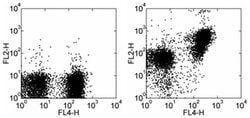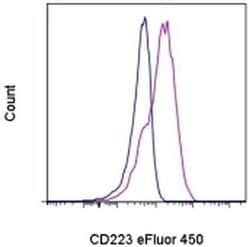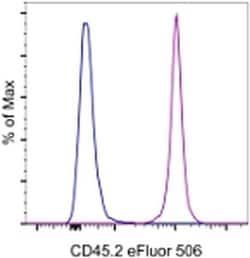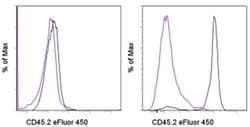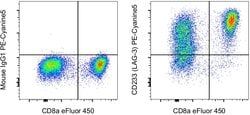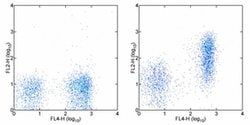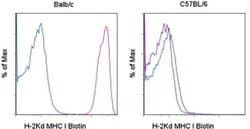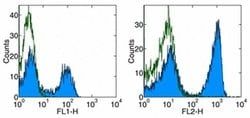50-120-53
CD272 (BTLA) Monoclonal Antibody (6F7), Biotin, eBioscience™, Invitrogen™
Manufacturer: Invitrogen
Select a Size
| Pack Size | SKU | Availability | Price |
|---|---|---|---|
| Each | 50-120-53-Each | In Stock | ₹ 10,559.85 |
50-120-53 - Each
In Stock
Quantity
1
Base Price: ₹ 10,559.85
GST (18%): ₹ 1,900.773
Total Price: ₹ 12,460.623
Antigen
CD272 (BTLA)
Classification
Monoclonal
Concentration
0.5 mg/mL
Formulation
PBS with 0.09% sodium azide; pH 7.2
Gene Accession No.
Q7TSA3
Gene Symbols
BTLA
Purification Method
Affinity chromatography
Regulatory Status
RUO
Gene ID (Entrez)
208154
Content And Storage
4° C, store in dark, DO NOT FREEZE!
Form
Liquid
Applications
Flow Cytometry
Clone
6F7
Conjugate
Biotin
Gene
BTLA
Gene Alias
A630002H24; B and T lymphocyte associated; B and T lymphocyte associated protein; B and T lymphocyte attenuator; B- and T-lymphocyte attenuator; B- and T-lymphocyte-associated protein; BTLA; BTLA_HUMAN; BTLA1; CD272; CD272 antigen; FLJ16065; MGC129743
Host Species
Mouse
Quantity
25 μg
Primary or Secondary
Primary
Target Species
Mouse
Product Type
Antibody
Isotype
IgG1 κ
Description
- Description: The BTLA antibody reacts with mouse BTLA, B and T lymphocyte attenuator
- BTLA is expressed by peripheral lymphocytes, splenic macrophages, developing B cells in the bone marrow and developing T cells in the thymus and mature, but not immature bone marrow-derived dendritic cells
- BTLA has been implicated as a negative regulator of the activation and/or function of various hemopoietic cell types
- It is reported that BTLA binds to B7-H4, but further studies are needed to confirm this interaction
- Note: The anti-mouse BTLA monoclonal antibody 6F7 is reported to stain CD4^+ and CD8^+ single-positive (SP) thymocytes (Hurchla et al)
- However, other anti-mouse BTLA clones generated simultaneously with 6F7 (8F4, 3F9.D12, 6G3 and 6H6) do not stain SP thymocytes
- It is not understood why there is a discrepancy in thymocyte staining however clones 8F4, 3F9.D12, 6G3 and 6H6 stain similar populations to 6F7 in splenocytes and bone marrow cells
- Applications Reported: This 6F7 antibody has been reported for use in flow cytometric analysis
- Applications Tested: This 6F7 antibody has been tested by flow cytometric analysis of mouse splenocytes
- This can be used at less than or equal to 0.125 μg per test
- A test is defined as the amount (μg) of antibody that will stain a cell sample in a final volume of 100 μL
- Cell number should be determined empirically but can range from 10^5 to 10^8 cells/test
- BTLA or B and T-lymphocyte attenuator is a member of the co-inhibitory receptors of the CD28 superfamily
- BTLA is a lymphocyte inhibitory receptor which inhibits lymphocytes during immunes responses
- BTLA is constitutively expressed on most CD4+ and CD8+ T cells and its expression progressively decreases upon T cell activation
- It remains expressed on Th1 cells, but not Th2 cells
- BTLA is a unique co-receptor that interacts with the tumor necrosis factor receptor superfamily member herpesvirus entry mediator (HVEM)
- This interation is an important pathway regulating lymphocyte activation and/or homeostasis in the immune response.
Compare Similar Items
Show Difference
Antigen: CD272 (BTLA)
Classification: Monoclonal
Concentration: 0.5 mg/mL
Formulation: PBS with 0.09% sodium azide; pH 7.2
Gene Accession No.: Q7TSA3
Gene Symbols: BTLA
Purification Method: Affinity chromatography
Regulatory Status: RUO
Gene ID (Entrez): 208154
Content And Storage: 4° C, store in dark, DO NOT FREEZE!
Form: Liquid
Applications: Flow Cytometry
Clone: 6F7
Conjugate: Biotin
Gene: BTLA
Gene Alias: A630002H24; B and T lymphocyte associated; B and T lymphocyte associated protein; B and T lymphocyte attenuator; B- and T-lymphocyte attenuator; B- and T-lymphocyte-associated protein; BTLA; BTLA_HUMAN; BTLA1; CD272; CD272 antigen; FLJ16065; MGC129743
Host Species: Mouse
Quantity: 25 μg
Primary or Secondary: Primary
Target Species: Mouse
Product Type: Antibody
Isotype: IgG1 κ
Antigen:
CD272 (BTLA)
Classification:
Monoclonal
Concentration:
0.5 mg/mL
Formulation:
PBS with 0.09% sodium azide; pH 7.2
Gene Accession No.:
Q7TSA3
Gene Symbols:
BTLA
Purification Method:
Affinity chromatography
Regulatory Status:
RUO
Gene ID (Entrez):
208154
Content And Storage:
4° C, store in dark, DO NOT FREEZE!
Form:
Liquid
Applications:
Flow Cytometry
Clone:
6F7
Conjugate:
Biotin
Gene:
BTLA
Gene Alias:
A630002H24; B and T lymphocyte associated; B and T lymphocyte associated protein; B and T lymphocyte attenuator; B- and T-lymphocyte attenuator; B- and T-lymphocyte-associated protein; BTLA; BTLA_HUMAN; BTLA1; CD272; CD272 antigen; FLJ16065; MGC129743
Host Species:
Mouse
Quantity:
25 μg
Primary or Secondary:
Primary
Target Species:
Mouse
Product Type:
Antibody
Isotype:
IgG1 κ
Antigen: __
Classification: __
Concentration: __
Formulation: __
Gene Accession No.: __
Gene Symbols: __
Purification Method: __
Regulatory Status: __
Gene ID (Entrez): __
Content And Storage: __
Form: __
Applications: __
Clone: __
Conjugate: __
Gene: __
Gene Alias: __
Host Species: __
Quantity: __
Primary or Secondary: __
Target Species: __
Product Type: __
Isotype: __
Antigen:
__
Classification:
__
Concentration:
__
Formulation:
__
Gene Accession No.:
__
Gene Symbols:
__
Purification Method:
__
Regulatory Status:
__
Gene ID (Entrez):
__
Content And Storage:
__
Form:
__
Applications:
__
Clone:
__
Conjugate:
__
Gene:
__
Gene Alias:
__
Host Species:
__
Quantity:
__
Primary or Secondary:
__
Target Species:
__
Product Type:
__
Isotype:
__
Antigen: MHC Class I (H-2Kd)
Classification: Monoclonal
Concentration: 0.5 mg/mL
Formulation: PBS with 0.09% sodium azide; pH 7.2
Gene Accession No.: P01901, P03991, P04223, P14428
Gene Symbols: H2-K1
Purification Method: Affinity chromatography
Regulatory Status: RUO
Gene ID (Entrez): 14972
Content And Storage: 4° C, store in dark, DO NOT FREEZE!
Form: Liquid
Applications: Flow Cytometry
Clone: SF1-1.1.1
Conjugate: Biotin
Gene: H2-K1
Gene Alias: class I major histocompatibility antigen H-2Kd; H-2 class I histocompatibility antigen, K-B alpha chain; H-2 class I histocompatibility antigen, K-D alpha chain; H-2 class I histocompatibility antigen, K-K alpha chain; H-2 class I histocompatibility antigen, K-Q alpha chain; H-2 class I histocompatibility antigen, K-W28 alpha chain; H-2K; H2-K; H-2K(B); H-2K(d); H-2K(K); H-2K(Q); H2-K1; histocompatibility 2, K1, K region; K-f; MGC184092; MGC7052; MHC class I antigen; MHC class I H2-K-b-alpha-2 cell surface glycoprotein; MHC class I heavy chain H2-K; MHC H2-K transplantation antigen
Host Species: Mouse
Quantity: 100 μg
Primary or Secondary: Primary
Target Species: Mouse
Product Type: Antibody
Isotype: IgG2a κ
Antigen:
MHC Class I (H-2Kd)
Classification:
Monoclonal
Concentration:
0.5 mg/mL
Formulation:
PBS with 0.09% sodium azide; pH 7.2
Gene Accession No.:
P01901, P03991, P04223, P14428
Gene Symbols:
H2-K1
Purification Method:
Affinity chromatography
Regulatory Status:
RUO
Gene ID (Entrez):
14972
Content And Storage:
4° C, store in dark, DO NOT FREEZE!
Form:
Liquid
Applications:
Flow Cytometry
Clone:
SF1-1.1.1
Conjugate:
Biotin
Gene:
H2-K1
Gene Alias:
class I major histocompatibility antigen H-2Kd; H-2 class I histocompatibility antigen, K-B alpha chain; H-2 class I histocompatibility antigen, K-D alpha chain; H-2 class I histocompatibility antigen, K-K alpha chain; H-2 class I histocompatibility antigen, K-Q alpha chain; H-2 class I histocompatibility antigen, K-W28 alpha chain; H-2K; H2-K; H-2K(B); H-2K(d); H-2K(K); H-2K(Q); H2-K1; histocompatibility 2, K1, K region; K-f; MGC184092; MGC7052; MHC class I antigen; MHC class I H2-K-b-alpha-2 cell surface glycoprotein; MHC class I heavy chain H2-K; MHC H2-K transplantation antigen
Host Species:
Mouse
Quantity:
100 μg
Primary or Secondary:
Primary
Target Species:
Mouse
Product Type:
Antibody
Isotype:
IgG2a κ
Antigen: TCR beta
Classification: Monoclonal
Concentration: 0.5 mg/mL
Formulation: PBS with 0.09% sodium azide; pH 7.2
Gene Accession No.: 0
Gene Symbols: Tcrb
Purification Method: Affinity chromatography
Regulatory Status: RUO
Gene ID (Entrez): 21577
Content And Storage: 4° C, do not freeze
Form: Liquid
Applications: Flow Cytometry
Clone: H57-597
Conjugate: Biotin
Gene: Tcrb
Gene Alias: bTCR; FLJ22602; MGC117436; MGC22624; MGC23964; MGC71411; T cell receptor beta chain; t-cell antigen receptor; T-cell receptor; TCR beta; Tcra; Tcrb; TCRbeta; TCRD; Tib; TRA
Host Species: Armenian Hamster
Quantity: 100 μg
Primary or Secondary: Primary
Target Species: Mouse
Product Type: Antibody
Isotype: IgG
Antigen:
TCR beta
Classification:
Monoclonal
Concentration:
0.5 mg/mL
Formulation:
PBS with 0.09% sodium azide; pH 7.2
Gene Accession No.:
0
Gene Symbols:
Tcrb
Purification Method:
Affinity chromatography
Regulatory Status:
RUO
Gene ID (Entrez):
21577
Content And Storage:
4° C, do not freeze
Form:
Liquid
Applications:
Flow Cytometry
Clone:
H57-597
Conjugate:
Biotin
Gene:
Tcrb
Gene Alias:
bTCR; FLJ22602; MGC117436; MGC22624; MGC23964; MGC71411; T cell receptor beta chain; t-cell antigen receptor; T-cell receptor; TCR beta; Tcra; Tcrb; TCRbeta; TCRD; Tib; TRA
Host Species:
Armenian Hamster
Quantity:
100 μg
Primary or Secondary:
Primary
Target Species:
Mouse
Product Type:
Antibody
Isotype:
IgG
